6 Best Jean Rollin’s Films + the Rest (Deep Overview)
This is a mini-guide to all of Jean Rollin’s best films. Its main purpose is
to help newbies to Jean Rollin’s universe decide which ones to choose as
their first (or next) Jean Rollin’s movies to watch.
First, I
will go over six best Jean Rollin’s works that are, in my opinion, the most
appropriate to start with. Then, I will describe each of the rest of his
full-length movies.
Now,
let’s get down to business.
Short Summary of Jean Rollin’s Style
To avoid repeating the same details in each movie’s description, in this short section I’ll explain the highlights applicable to most Jean Rollin’s films.
-
Beautiful locations: castles and mansions, French countryside,
cemeteries, seashores (especially the pebble beach in Pourville sur Mer,
near Dieppe), etc.
-
Naivety. Often, characters act illogically, like if the script
wasn’t thought-through enough. Apparently, Jean Rollin prioritized beauty
and emotions over realism.
-
Technical flaws (‘sleaze’). Because of the low budget and lack of
professionalism, otherwise serious scenes may look ridiculous. Which is
not necessarily a bad thing, as this makes the viewer smile.
-
Tragedy. Despite the flaws bringing unplanned comedy into his
works, Jean Rollin’s films also evoke serious feelings. They are often
tragic stories about love and friendship (especially between two
girls).
-
Fantasy and magic. Oftentimes, Jean Rollin’s films include
vampires, living dead, magic rituals, supernatural forces, secret
societies, and other fantastic characters and paranormal events.
-
Violence and horror. Jean Rollin’s films often exploit traditional
horror subject matters, featuring scenes of murder and other type of
violence. But they are very unrealistic. Normally, humiliation and
especially rape scenes in cinema upset me considerably. But in Jean
Rollin’s movies, because of the lack of realism and professionalism, they
look rather ridiculous, childish (or at least too theatrical) and, as a
result, aren’t as depressing to watch.
As Dominique Toussaint says in Jean Rollin’s penultimate film, The Night of the Clocks, “He loved violence, but only when it was unreal, staged...”.
I also often hear that Jean Rollin didn’t direct his actors strictly enough. Partially because of this, vampires and other villains look rather comical than evil and sinister.
The only truly terrifying (and so tragic!) scene that I recall is the ending of The Living Dead Girl.
So I mostly consider Jean Rollin’s ‘horror’ films to be either tragic dramas, fantasy stories, or comedies rather than horror.
In this list of 6 best Jean Rollin’s films for newbies to start with, I tried to select movies of various genres and periods. This is to present the director’s talent from various sides rather than suggesting a few similar films just because they are the most popular.
#1 Fascination (1979)
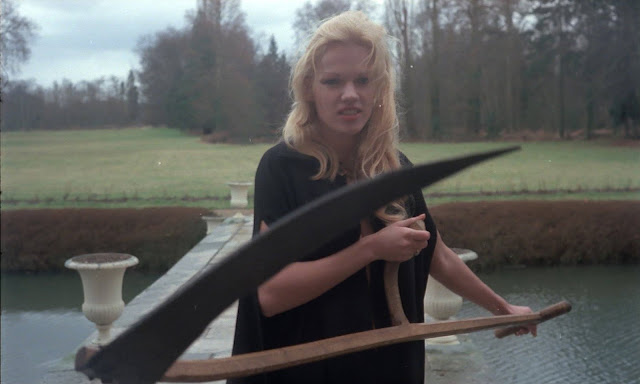 |
| Brigitte Lahaie |
Plot Summary
A thief escapes from his bandit comrades with the money they stole together.
He finds a chateau and hides inside.
The chateau is empty except
for two young ladies in it. The man learns that the ladies are expecting
guests coming at night. There is a mysterious and macabre event planned for
midnight. Intrigued, the thief decides to stay and see what is going to
happen.
Movie Highlights
- Mystery
- Late 19th - early 20th century ambiance
- A bit of eroticism
Why I Love It
Fascination is my favourite film ever. I adore it for its ambiance (a
gloomy chateau, cloudy weather), intriguing macabre story, and the elegant
style of the 19th - early 20th century.
The plot is
well-elaborated. The events aren’t unfolding in an obvious, predictable way.
During the film, the viewer wonders what kind of evil awaits the main
character at the end. There is also a subtle love storyline incorporated.
Not overly sentimental, but rather malicious and cruel.
This classic decadent story leaves a long-lasting impression.
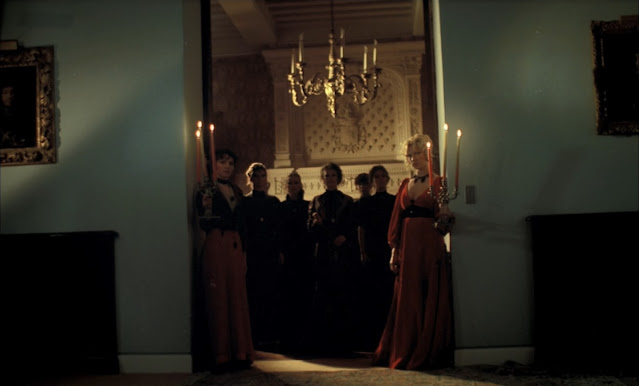 |
| The malicious company of perverse ladies with Franca Maï on the left, Fanny Magier in the very center, and Brigitte Lahaie on the right |
Why Start with It
To get introduced to the director’s style and filmography,
Fascination would be an appropriate first Jean Rollin’s film,
especially for viewers who aren’t used to sleazy b-movies.
While
still being a low-budget film, Fascination almost corresponds to
mainstream-quality movies. It doesn’t contain too obvious ridiculous
imperfections that sometimes make other Jean Rollin’s films look like
comedies (often contrary to the original intent of the director to make a
serious romantic fantasy story). However, viewers who like nitpicking will
notice that sometimes the actors’ play isn’t ideal.
Fascination
was even supposed to be distributed by UGC, one of the major distributors in
France. Unfortunately, at the last moment, the company let Jean Rollin down
for obscure reasons. As a result, the film hasn’t got an appropriate theater
release at all. However, this hasn’t prevented it from becoming a cult
classic after decades.
Additional Information
Learn more detail about
Fascination by Jean Rollin
from my dedicated article.
After watching the film, if you want
to learn more about the actress who played Hélène (the chief of the perverse
ladies), you are welcome to read my
interview with Fanny Magier.
For those who already know and love this film, I made these print T-shirt designs. Download them for free (as well as my 50 other b-movie shirt prints) and order a shirt from any print-on-demand service you like.
#2 The Shiver of the Vampires (1970)
 |
| Dominique Toussaint as the vampire who seduces the main female character |
Plot Summary
A newlywed couple goes on a honeymoon trip. They stay at a chateau of the bride’s distant relatives. Little do they know that her two cousins are now vampires. The girl is bewitched and seduced by the cousins’ vampire mistress — Isolda — and is involved in black magic rituals. The young husband has to fight for his and his young wife’s future as a family.
Movie Highlights
- Spooky gothic chateau
- Rural ambiance
- Vampires
- Eroticism
- Ridiculousness
Why I Love It
I love this film because it’s 1) beautiful and 2) hilarious.
Just
like in Fascination, there is an old chateau — even a more macabre
and gothic one. And a cemetery. And a beach (the one in Pourville-Sur-Mer
near Dieppe, that Jean Rollin used in many of his other films). The film has
an ambiance of old-time rural France. There are macabre vampire rituals and
memorable characters wearing appropriate attire. In general, the vampire
story atmosphere is well created. That’s regarding the “beautiful” part.
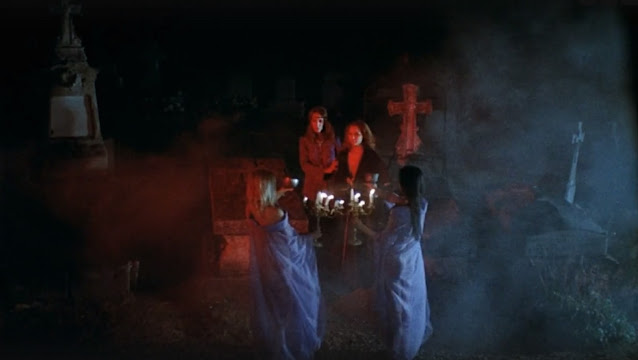 |
| A mystical vampire ritual at a cemetery |
Now, let’s talk about the “hilarious” one.
The Shiver of the Vampires basically feels like a comedy, while it
was probably supposed to be a serious story. The movie doesn’t contain
obvious jokes. But it feels unserious because of its naivety.
First
of all, the two vampire cousins look like old hobo alcoholics dressed like
pimps from the 70’s blaxploitation films rather than correspond to the
classic vampire cliché — an elegant and attractive nobleman. And Isolda,
their vampire mistress, looks like a hippie.
 |
| Jacques Robiolles (left) and Michel Delahaye (right) as the funny vampires |
The other detail amplifying the “hippie” vibe is the soundtrack. It was
recorded by an amateur rock band Achantus. You will hear cool hard rock guitar
riffs, licks, and botched rocking bluesy solos. Obviously, their combination
with the gothic story atmosphere feels rather comical.
There is a
scene, at the end, that makes me laugh out loud. The vampires are violating
the girl on the beach. It’s a tragic and critical moment for her husband. A
scene deserving an appropriate music piece to amplify the emotional tension in
the viewer who is supposed to be worried about the protagonists’ future.
And
at this critical moment, I hear a cool rocking solo kicking in, accompanying
the evil the vampires are doing to the life of the young couple with whom I
empathize as a viewer. The funniest thing is that this rocking jam steals the
show, drawing all attention to itself from what is happening on the screen.
While
watching this scene, I literally start nodding my head and stomping my feet to
the beat of this “cool” rock music piece. I find this incompatibility
hilarious. It’s even more hilarious because of the fact that the solo is
pretty badly played too, even though it still rocks.
Why Start with It
If you want to explore Jean Rollin’s films because you heard he was one of
the directors making those b-movies that look funny because of how badly
they are made, that’s a good point to take off.
The Shiver of the Vampires is a great example of a cheap and sleazy
exploitation film.
At the same time, it is beautiful and it does
provide what the viewer looking for a typical vampire story expects to see:
eroticism, a spooky castle, dark rituals, and other traditional
genre-specific attributes.
Additional Information
Marie-Pierre Castel (one of the Castel twins whom you can often see in Jean
Rollin’s films), who played one of the vampires’ servants, talks about this
film, as well as her other roles in Jean Rollin’s movies, in this old 70’s
interview with Marie-Pierre Castel
that I translated from French.
It seems to me, the plot of
The Shiver of the Vampires was partially inspired by the classic
gothic story Carmilla written by Joseph Sheridan Le Fanu in 1872
(twenty five years before Bram Stoker's Dracula). The main storyline
revolves around a young lady being seduced by an evil vampire woman.
The
same subject matter has been used in other exploitation films. Two examples
I remember are
The Blood Spattered Bride (1973) by Vicente Aranda
and a Hammer Horror classic The Vampire Lovers (1970) by Roy Ward
Baker. Both of these films also show a couple in which the woman is seduced
by a female vampire.
For the fans of Jean Rollin's vampire movies, I made these print T-shirt designs. Download them for free (as well as my 50 other b-movie shirt prints) and order a shirt from any print-on-demand service you like.
#3 The Night of the Hunted (1980)
 |
| Brigitte Lahaie and Dominique Journet |
Plot Summary
Two young women run from a mental hospital and are chased in the night. One
of them (Brigitte Lahaie) gets picked up by a driver. The man sees that the
girl doesn’t remember who she is, what happened to her, and from whom she is
escaping. He takes the girl home, but the next day she is kidnapped. The man
investigates this shady and apparently illegal case to find and save the
mysterious woman with whom he’s already fallen in love.
Meanwhile,
the girl is going through a series of dangerous adventures attempting
another escape from the clinic.
Movie Highlights
- Depressing urban ambiance (1980’s brutalism, neo futurism)
- Tragic love story
- Adventures
Why I Love It
The Night of the Hunted offers a thrilling plot making the viewer
wonder what is going to happen next. It’s full of adventures and doesn’t
feel boring. Being partially a tragic love story, the film evokes the
viewer’s compassion towards the characters.
The ambiance matches
the story very well. The film has a dark sci-fi flavor given by the bleak
and austere hospital building (which in reality is an office building). As
well as by the unusual interior with the dominating aggressive red color
(such an inappropriate choice for a mental hospital).
 |
| Brigitte Lahaie and Dominique Journet |
Why Start with It
Jean Rollin’s name is most often associated with vampire and fantasy films. If this is what you are looking for, better choose another movie as your very first Rollin. But The Night of the Hunted is worth being included in at least your first five Rollin films: it’s very well-made and will help you see the director's talent from a very different perspective than his another erotic fantasy movie.
Additional Information
I have an old article dedicated to The Night of the Hunted by Jean Rollin reviewing it in a little bit more detail and featuring more photos.
#4 The Demoniacs (1974)
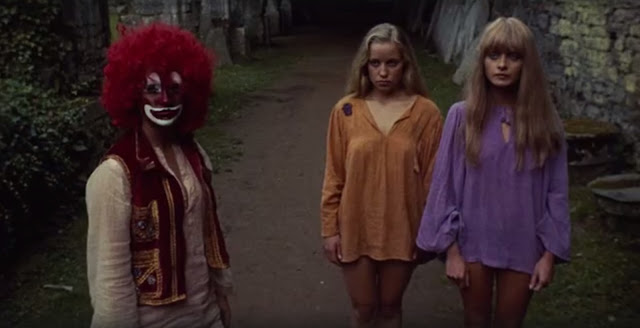 |
| Left to right: Mireille Dargent, Lieva Lone, and Patricia Hermenier |
Plot Summary
A gang of former pirates lives off robbing ships that they intentionally
mislead by imitating a lighthouse, having them crash on the reefs. One day,
after another wreck, they find two young women who managed to survive. Being
abominable sadists, they rape and torture the girls, and leave them to
die.
Later the bandits find out that their victims have survived,
despite everything. Moreover, the girls got to the local sacred ruins where
an ancient demon is waiting for someone to liberate him. The life of the
whole town is now in danger. Especially the lives of the bandits fearing the
diabolical revenge of the two poor girls who now possess dark supernatural
power.
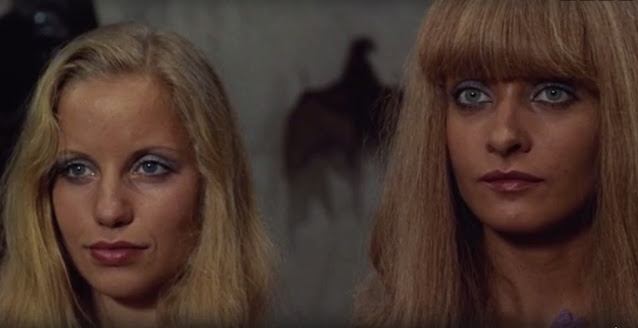 |
| Lieva Lone (left) and Patricia Hermenier (right) |
Movie Highlights
- Seaside ambiance
- 19th - early 20th century ambiance
- Supernatural
- Eroticism
- Ridiculousness
Why I Love It
First of all, The Demoniacs is a very beautiful film visually. I love
the maritime setting: the sea with a rocky shore, a shipwreck cemetery, a
tavern for marines with the atmosphere of the 19th century, and the
magnificent ruins of a temple where the demon is guarded by his occultist
wardens.
I love the fact that apart from the nearly-pirate story
vibe, the plot also incorporates a supernatural plot line.
 |
| Joëlle Cœur |
The film is full of beautiful and memorable characters, notably:
- A voluptuous brunette Joëlle Cœur in the role of the gang leader’s lover (she is so seductive that I’m mentioning her first).
- Lieva Lone and Patricia Hermenier as the victim girls — two adorable and innocent-looking blue-eyed blondes.
- The mysterious clown girl played by Mireille Dargent.
- Louise Dhour as a prideful, brave owner of the tavern and a talented singer and pianist (who also plays an identical, basically the same, role in a later Jean Rollin’s film — The Escapees, 1981).
- John Rico — the totally mad and dangerous “captain”, the leader of the gang.
- Willy Braque as another gang member who often played “cool guys” in Jean Rollin’s and Jess Franco’s films.
- And the last gang member was interpreted by Paul Bisciglia who played rather cowardly men in other Jean Rollin’s films too (and because of this, he reminds me of the Soviet actor — Georgiy Vitsin. Vitsin is famous for his role of The Coward in multiple Soviet comedies featuring the hilarious outlaw trio in which the two other roles belonged to Yuri Nikulin as The Fool and Yevgeny Morgunov as The Battle-Seasoned. Even Paul Bisciglia’s face resembles the one of Vitsin).
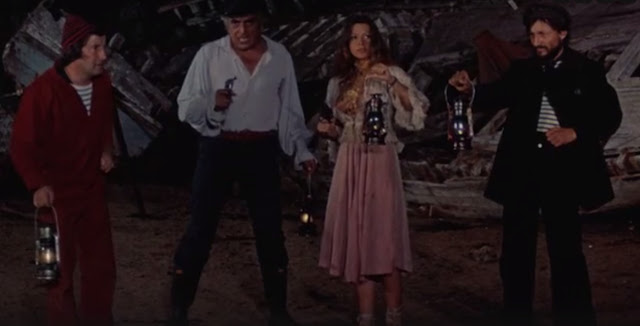
|
|
From left to right: Paul Bisciglia, John Rico, Joelle Coeur, and Willy
Braque. |
The actors’ play looks rather theatrical, exaggerated than realistic. This,
however, gives the film a specific old-school vibe. I had a feeling of
reading a pirate adventure novel by Robert Louis Stevenson.
And
last but not least — this film is funny. Obviously, it was supposed to be
serious, mysterious, and tragic. Which it kind of is, but, just like
The Shiver of the Vampires, as well as many other Jean Rollin’s
films, The Demoniacs contains so much sleaze and looks so naive that
the story doesn’t feel completely serious. Sometimes the characters make
silly decisions and act completely illogically and ridiculously.
On
the top of that, you see multiple technical flaws. For example, there is a
scene where the bandits set a whole abandoned ship on fire by throwing one
lantern at it. The flames spread immediately which makes it obvious that in
fact, the crew used a generous amount of gasoline or other fuel.
The
opening scene is shot at night. There are no stars in the sky, and we hear
violent storm sounds in the background. This night should be totally dark.
But we see the characters on the seashore rocks lit like during a sunny day.
It’s so obvious that there is a powerful searchlight illuminating the
setting.
These details made me laugh, which is not bad at all. If
this film was made realistically, it would be an unbearably depressing and
tragic story full of humiliation and suffering.
Why Start with It
The Demoniacs is a beautiful and captivating story representing Jean Rollin’s golden period as a director. It stands in one line with his classic vampire films, even though instead of vampires it involves another kind of supernatural.
For those who already know and love this film, I made these print T-shirt designs. Download them for free (as well as my 50 other b-movie shirt prints) and order a shirt from any print-on-demand service you like.
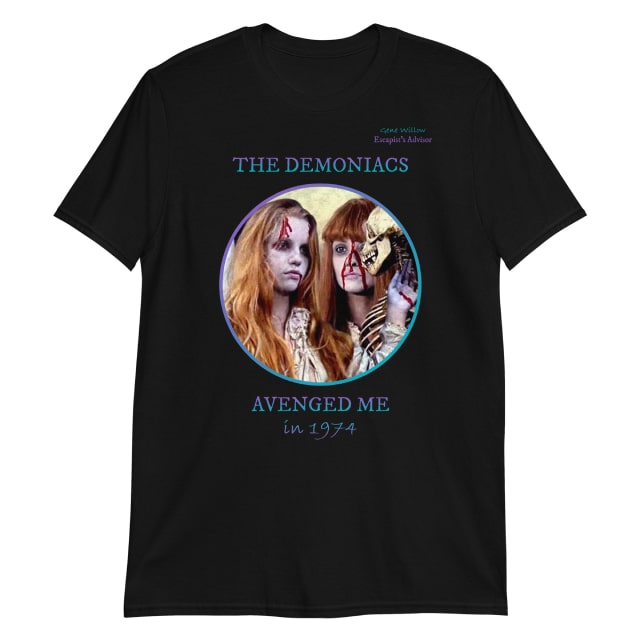
#5 The Night of the Clocks (2007)
 |
| Ovidie as Isabelle, the main character |
Plot Summary
Isabelle is a young woman whose cousin, a writer and film director, has recently died. Isabelle visits her deceased cousin’s mansion to meet characters from his accomplished as well as unfinished stories whose spirits still reside in the house.
Movie Highlights
- Surrealism
- Supernatural
- A portal to Jean Rollin’s older films
Why I Love It
The Night of the Clocks has a strong otherworldly ambiance. It takes the
viewer into the magical imaginary universe of Jean Rollin’s characters,
basically inside his head. The main character’s late cousin, obviously,
symbolizes Jean Rollin himself.
The film feels surreal without
being unclear, so it’s relatively easy to watch for people preferring films
where they don’t need to invent their own explanation for what they’ve just
watched. However, it will feel boring to the ones who strongly prefer action
or traditional stories based on a problem introduced at the beginning and
resolved at the end.
 |
| Left to right: Jean Depelley, Sabine Lenoël, and Fabrice Maintoux |
I watched The Night of the Clocks when I had already seen at least half
of Jean Rollin’s movies. So it was interesting to see references to familiar
characters and stories as well as to the ones I was yet to discover.
Notably,
you will meet Dominique (Anne-Dominique Toussaint) who played two memorable
vampire roles in Jean Rollin’s The Shiver of the Vampires and
Requiem for a Vampire and who now plays herself in
The Night of the Clocks being an aged lady. There are also Natalie
Perrey, Jean-Loup Philippe, Françoise Blanchard, and Jean Rollin’s other
frequent collaborators.
 |
| Sabine Lenoël |
I especially liked beautiful Sabine Lenoël whom we also see in Jean Rollin’s
Dracula’s Fiancée and The Mask of Medusa (a film following
The Night of the Clocks, the last Jean Rollin’s finished movie).
There
is Jean Rollin’s niece too — Sandre Thoquet as a ghost at the cemetery, at the
beginning of the film. And his wife — Simone Rollin.
Why Start with It
It’s a good idea to watch The Night of the Clocks as one of your first few Jean Rollin’s films because it will warm up your curiosity for the ones that you haven’t seen yet. Apart from Jean Rollin’s collaborators, you will also see multiple excerpts taken from his previous movies — they are inserted contextually to show the link between the present and the past, between the characters, their memories, and the imaginary universe created by Jean Rollin.
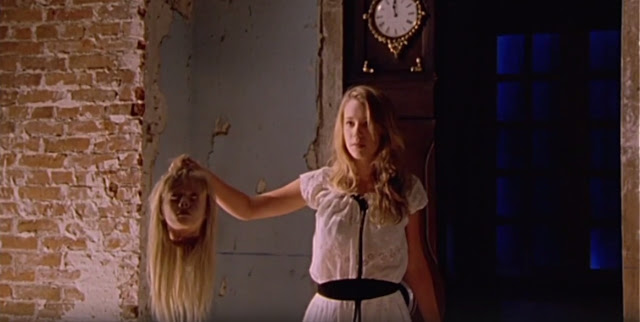 |
| One of the references to Jean Rollin's previous films |
At the same time, keep in mind that The Night of the Clocks is
very different from the majority of the director’s works. So I wouldn’t
advise you to choose it as your very first Rollin film. Better watch a
couple of his more traditional films before it.
Additional Information
As Véronique Djaouti-Travers, Jean Rollin’s close friend and assistant,
notes in our interview,
Many said or wrote about this film as a testament film of J. Rollin. It’s
not true.
Learn more about the filming of The Night of the Clocks from
my
interview with Véronique D-Travers, Jean Rollin’s right-hand person. It includes a few unbelievable and funny
anecdotes from the making of Jean Rollin’s other films as well.
#6 Schoolgirl Hitchhikers (1973)
 |
| Joëlle Cœur |
Plot Summary
Two beautiful girls (Joëlle Cœur and Gilda Arancio) are hiking. They find an empty secluded house where they spend the night. The house appears to belong to bandits who find and detain the girls, mistakenly accuse them of stealing their diamonds, and try to get their treasures back. Later, a detective and the gangsters’ colleagues get involved, which adds to the complexity of the situation.
Movie Highlights
- Silly comedy
- Eroticism
- Secluded luxury house ambiance
Why I Love It
Schoolgirl Hitchhikers is a funny and playful erotic comedy and adventure film. It simply delivers exactly what it’s meant for. I had fun watching it and wasn’t bored.
 |
| Joëlle Cœur |
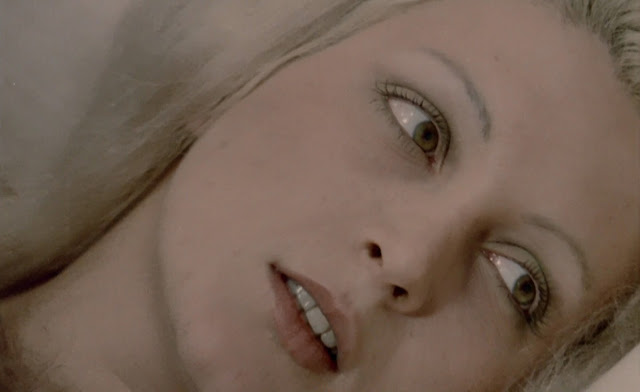 |
| Gilda Arancio |
I enjoyed the characters conceived as parodic images of typical gangsters,
the cheerful private detective (who has, however, a very untypical assistant
looking like a little schoolgirl), and, of course, the main beauties —
Joëlle Cœur and Gilda Arancio. At the end, we also see young Jean Rollin
himself playing the role of a cowardly thief.
The setting, a
luxury house, is simple and nice.
Why Start with It
Erotic comedy isn’t a genre that represents Jean Rollin well. His favourite
kind of film was fantasy films. I wouldn’t advise you to choose
Schoolgirl Hitchhikers as your very first Jean Rollin’s movie.
However, it can very well be placed at the end of the first six films list
to begin with. I’m including it here to present Jean Rollin’s talent from
various sides, including comedy.
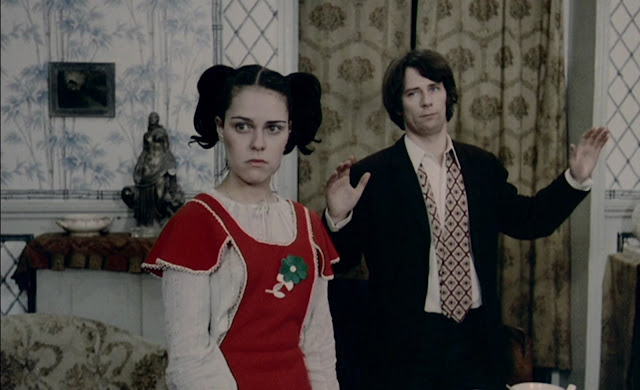 |
| Pierre Julien and Reine Thirion — the brave detective and his cute assistant |
Additional Information
There is no hitchhiking in the film. And the girls don’t look like schoolgirls. A verbatim translation of the original French title — ‘Shameless Girls’ (Jeunes filles impudiques) — would describe the film more appropriately.
Other Notable Films
In this section, I’m briefly going over the rest of Jean Rollin’s films that don’t belong to his pornographic filmography (except for Phantasmes), in a chronological order.
The Rape of the Vampire (1968)
 |
| Ariane Sapriel (supposedly) |
Plot Summary
The Rape of the Vampire consists of two short films —
The Rape of the Vampire and
Queen of the Vampires.
In the first film, four sisters
live in an old decaying house. They act like vampires which includes fear of
sunlight, occult practices, and other traditional vampire attributes. A
young psychoanalyst, who came from Paris with his girlfriend and friends, is
trying to convince the girls that their vampirism is imaginary.
The
vampire sisters are manipulated by a mysterious aristocratic old man who
sees the company of Parisians as a threat. Because of this, the young people
have to go through a series of dangerous and tragic misadventures.
The second film is a continuation of the first story. We meet the vampire Queen and her gang, witness their internal intrigues, and empathize with Thomas, the psychoanalyst from the previous film, in his attempts to stop the malicious vampire organization.
About the Film
As Jean Rollin himself said in his director’s commentary, the film is nearly incomprehensible. It’s difficult to follow and understand the storyline without explanation. Fortunately, I watched it as a release by Encore with Jean Rollin’s commentary included. Otherwise, it feels completely surreal, like an illogical dream.
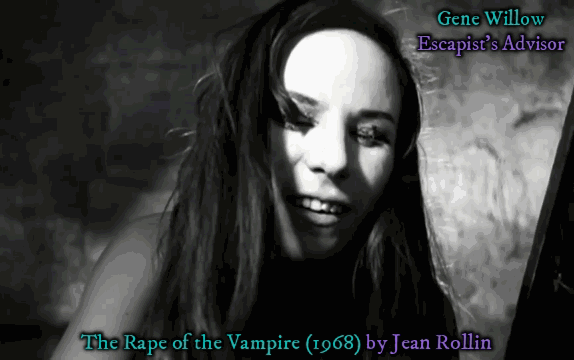 |
| Nicole Romain (supposedly) feeds Catherine Deville with Esmakra |
 |
| Jacqueline Sieger as the Queen of the vampires with Alain-Yves Beaujour and Olivier Rollin as her right-hand men |
The Rape of the Vampire is a beautiful film, despite being black and
white. We see many pretty locations and characters. We also get a good
portion of sleaze, especially the ridiculous handmade improvised statue of a
bat at the vampires’ ritual, closer to the end of the second film.
The
movie feels close to the succeeding Jean Rollin’s vampire works. However,
it’s also distinct because of being more surreal and less comprehensible as
a story.
The Nude Vampire (1970)
 |
| Caroline Cartier as the vampire girl |
Plot Summary
A son of a wealthy man happens to visit a mysterious secret party he isn’t invited to. The event looks like an esoteric society’s ritual and involves human sacrifice. The ritual revolves around a beautiful young woman who is supposedly treated like a deity. The young man becomes involved in a conflict between the cult members and a society of vampires fighting for the mysterious girl.
About the Film
The Nude Vampire includes details similar to
The Rape of the Vampire. Particularly a laboratory for research of an
anti-vampirism treatment. Rather than being a gothic vampire story, it’s
more of a futuristic sci-fi film.
Probably the most memorable
scene is the secret society’s ritual with bizarre masks worn by the members.
This scene makes me think that it probably was an inspiration for Stanley
Kubrick’s Eyes Wide Shut.
The Nude Vampire is Jean Rollin's first film where we see the iconic
twins — Marie-Pierre Castel and Catherine Castel. Marie-Pierre Castel tells
an interesting anecdote from the filming of one of the scenes in her interview. See this scene below.
For those who already know and love this film, I made this print T-shirt design. Download it for free (as well as my 50 other b-movie shirt prints) and order a shirt from any print-on-demand service you like.
Requiem for a Vampire (1971)
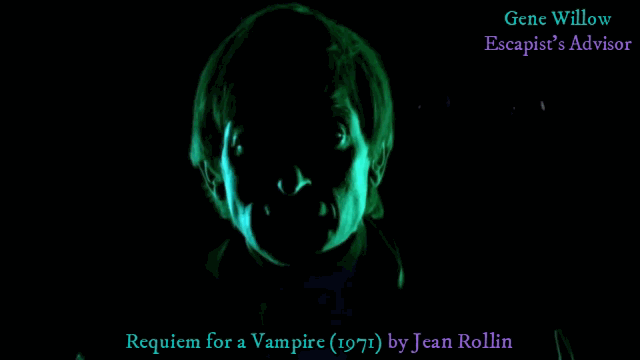 |
| Michel Delesalle as the terrifying vampire with Marie Pierre Castel and Mireille Dargent scared to death by him |
Plot Summary
After a dangerous car chase and gunfight, two young girls (Marie-Pierre Castel and Mireille Dargent) continue their run, wandering in the countryside. They find an old castle where vampires live. The vampires detain the girls to use them for their dark supernatural business.
About the Film
Requiem for a Vampire is a beautiful gothic vampire movie. It feels similar to The Shiver of the Vampires described above, and also features Dominique (Anne-Dominique Toussaint), basically in the same role.
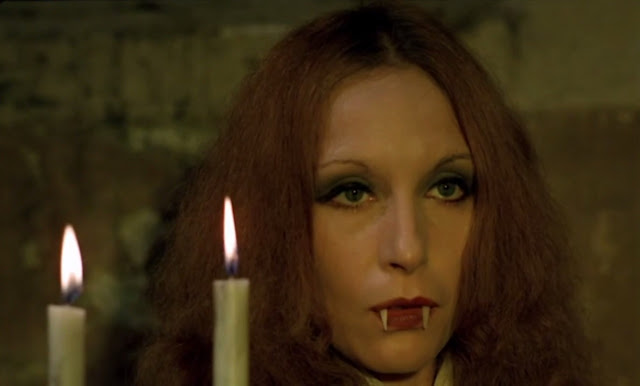 |
| Dominique Toussaint in another vampire role, similar to the one in The Shiver of the Vampires |
The events take place in a magnificent medieval castle, or even a fortress, with beautiful views from the vertiginous height of its stone walls, narrow spiral staircases, and a macabre basement with sexy female captives. The vampires themselves also look very traditional.
The overall ambiance, however, isn’t completely evil — because of Jean
Rollin’s rather cute and naive style preferring romanticism over realism.
Requiem for a Vampire feels very different from sinister films like
Vampire Ecstasy (The Devil's Plaything) by Joseph Sarno
shot in a similar setting, or other
films about satanic cults
and vampires.
As usual for Jean Rollin’s 70’s movies,
Requiem for a Vampire involves a good portion of eroticism.
For those who already know and love this film, I made this print T-shirt design. Download it for free (as well as my 50 other b-movie shirt prints) and order a shirt from any print-on-demand service you like.
The Iron Rose (1973)
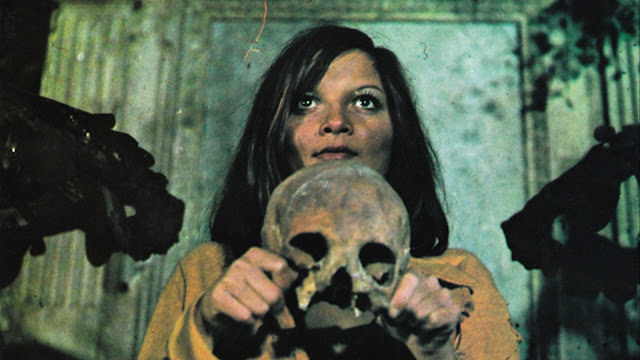 |
| A famous shot of Françoise Pascal with a skull |
Plot Summary
A girl (Françoise Pascal) and a boy (Hugues Quester) meet each other at their friends’ wedding. Later they have a date and go to the local cemetery. After the dark falls and the cemetery closes, the young people can’t find their way out. A mysterious supernatural force prevents the lovers from leaving the graveyard playing evil jokes with their minds, behaviour, and perception of reality.
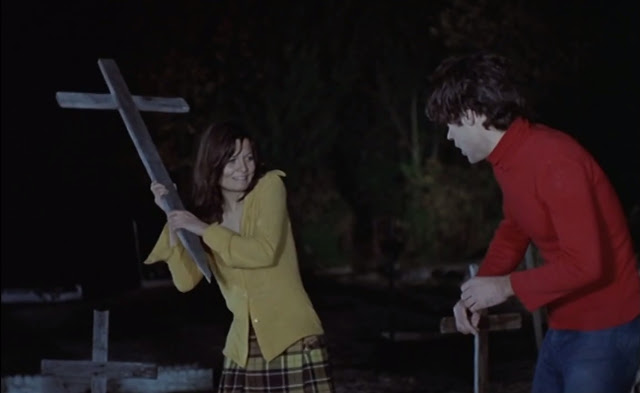 |
| Françoise Pascal and Hugues Quester |
About the Film
Probably, this is the most surreal movie by Jean Rollin. In terms of
action, The Iron Rose is the least saturated with events and even
dialogues. It’s basically about two young people wandering in a cemetery at
night, for almost the whole duration of the film. This makes
The Iron Rose stand out from the rest of Jean Rollin’s movies, even
though it still feels obviously rollinesque.
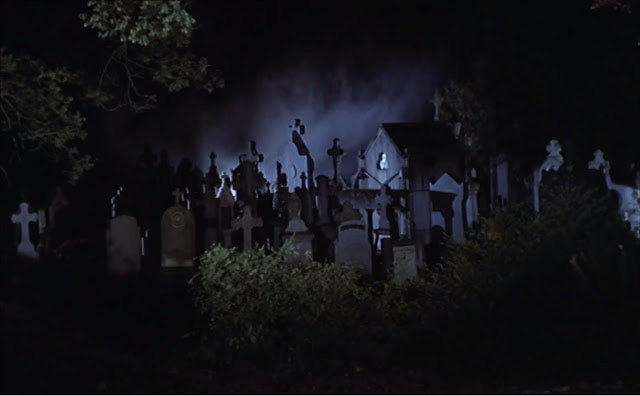 |
| The cemetery in Amiens |
Despite lacking events, the film felt enjoyable to me. There is a beautiful
gothic cemetery, beautiful Françoise Pascal, and scenes transferring her
character into a weird surreal or supernatural world. However, I wouldn’t
recommend it as the very first Jean Rollin’s movie to people preferring
stories and action over the atmosphere.
Watch this
interview with Francoise Pascal
where the actress shares her memories about making The Iron Rose as
well as talks about the rest of her career.
 |
| Natalie Perrey |
There is a funny story from the filming shared by Natalie Perrey. The crew filmed a real wedding for the opening scene. They attempted to shoot a real wedding a couple of times. At one wedding, the bride was beautiful, but the groom wasn’t handsome. At another one, the groom was handsome, but not the bride. So Jean Rollin or someone else from the crew said that these weddings were “badly organized”!
For those who already know and love this film, I made this print T-shirt design. Download it for free (as well as my 50 other b-movie shirt prints) and order a shirt from any print-on-demand service you like.
Fly Me the French Way (1974)
 |
| Brigitte Borghese and Annie Belle |
Plot Summary
Valérie (Joëlle Cœur) watches over her cousin’s apartment while he is on a trip. Valérie invites her girlfriend, Sophie (Marie-France Morel) to spend a night together. Sophie is kidnapped, by mistake, by the members of a secret sex cult who aims to blackmail Valérie’s cousin. Valérie and Sophie’s friend go to the mansion, where this secret organization is based, to liberate Sophie.
About the Film
I don’t have much to say about this silly erotic comedy. I tried to watch it
only once, and found it too boring to finish, even though Jean Rollin was
already my favourite director.
The film contains multiple sex
scenes that seemed boring to me, and on top of that too long. Even though
they involved Joëlle Cœur whom I find very beautiful.
 |
| Brigitte Borghese and Joëlle Cœur |
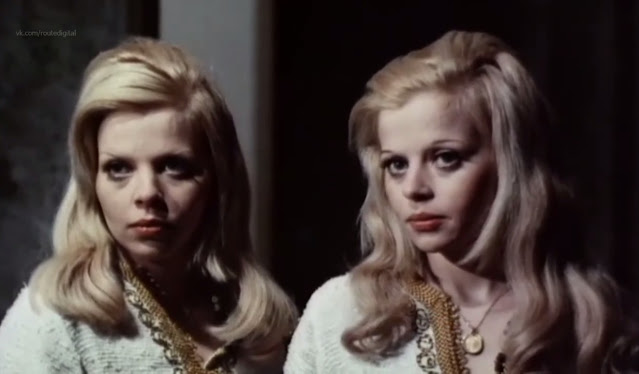 |
| Twin sisters Marie-Pierre Castel and Catherine Castel |
On the other hand, there is a nice luxury mansion of the mysterious sex cult
with various unusual attributes of an esoteric society. And Castel twins.
I
will probably update this section in the future if I give this film another
try and change my mind about it.
Phantasmes / The Seduction of Amy (1975)
Plot Summary
A girl running away from a rapist (played by Jean Rollin) comes to a luxurious chateau where she meets its owner — the count. The count appears to be a pervert who tortures his captives by subjecting them to sex rituals. However, he also has another side of his personality. The girl learns his tragic supernatural backstory that makes her experience warm feelings for the monster count.
About the Film
This is the first Jean Rollin’s film containing hardcore pornographic scenes. It’s basically a porn movie. However, it has a decent plot and mysterious atmosphere. There is a luxury mansion and a romantic storyline that I enjoyed.
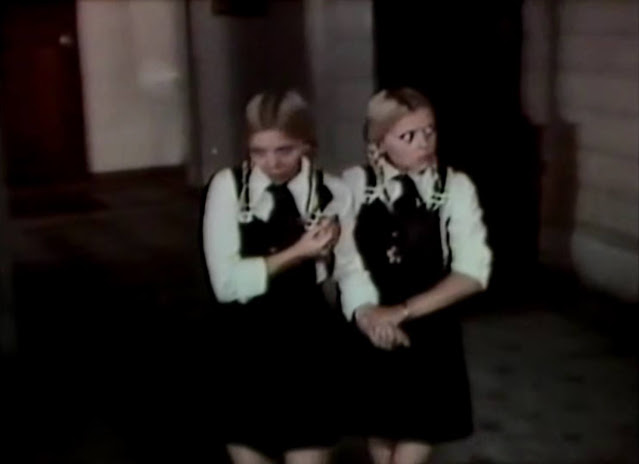
|
| Castel twin sisters |
Phantasmes also features comical elements, notably the naughty schoolgirls
played by Marie-Pierre and Catherine Castel, the famous twin sister
couple.
Lips of Blood (1975)

|
| Castel twin sisters |
Plot Summary
A young man, Frédéric (Jean-Loup Philippe), is haunted by visions from his
childhood. He sees a castle near the sea, a beautiful young lady (Annie
Belle), and other details looking like a fairy tale. However, these memories
are so unclear that Frédéric is unsure whether they reflect real events from
his past or are imaginary.
When the young man asks his mother
(Natalie Perrey) to shed light on this, he only gets responses looking like
his mom hides the truth from her son. Thus, Frédéric has to go through a
series of adventures to find the answer on his own, learn the shocking truth
about his family’s past, and reunite with the beautiful young lady visiting
and guiding him as an ethereal vision.
About the Film
Lips of Blood is another Jean Rollin’s romantic gothic vampire
film. I watched it twice. The first time, when I wasn’t familiar with Jean
Rollin and
European B-movies
in general, I found it cheap and boring. I gave it up after watching about
half of it. The second time, when Jean Rollin was already my favourite
director, and I had already got the taste for the low budget European
cinema, I liked the film.
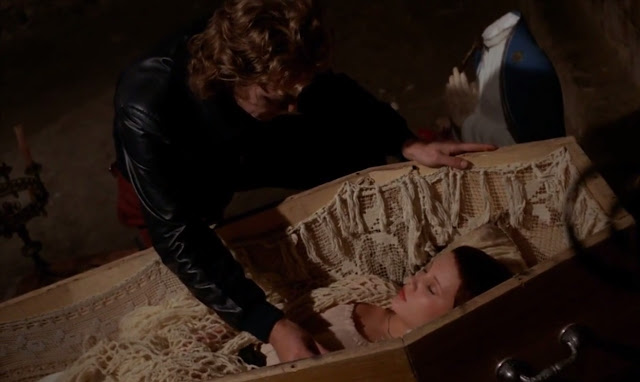 |
| Jean-Loup Philippe and Annie Belle |
So, probably, the first half of it may seem boring to unprepared viewers.
Even despite the intriguing beginning making the audience wonder about the
nature of the main character’s mysterious visions.
Closer to the
end, however, there is more action. We travel to the beautiful medieval
fortress, learn the main character’s family backstory connected to vampires,
we see vampires themselves (including Castel twin sisters), and finally meet
the girl from Frédéric’s dreams.
For those who already know and love this film, I made this print T-shirt design. Download it for free (as well as my 50 other b-movie shirt prints) and order a shirt from any print-on-demand service you like.
The Grapes of Death (1978)
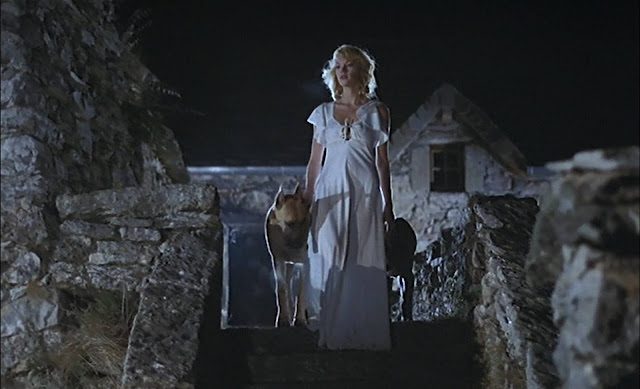 |
| Brigitte Lahaie |
Plot Summary
A young woman, Élisabeth (Marie-Georges Pascal), travels by train to meet
her boyfriend who works at a vineyard. When a man looking sick and crazy
attacks her, the girl leaves the train and runs for her life.
Elisabeth
reaches a nearby village and learns that its residents suffer from a disease
making them rot alive and act aggressively. To get to her beloved, the young
woman has to take a difficult and dangerous path lying across the
countryside full of infected bloodthirsty inhabitants.
 |
| Mirella Rancelot as a cute blind girl |
About the Film
Unlike Jean Rollin’s vampire ‘horror’ films that feel rather comical
and romantic, The Grapes of Death has a sinister and depressing
ambiance. It does have occasional bad acting and low quality special effects
that may seem funny to the viewer (notably obviously fake makeup showing
sores releasing ample quantities of oozy substances).
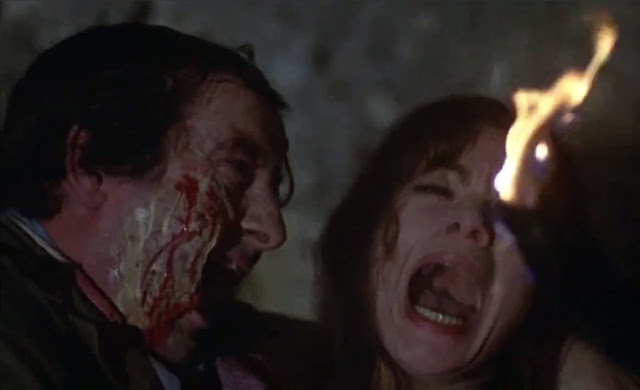 |
| Paul Bisciglia and Marie-Georges Pascal |
However, overall, Jean Rollin succeeded to maintain the disquieting fatalistic spirit of a devastating epidemic ruining the lives of entire villages and threatening the main character with whom we empathize.
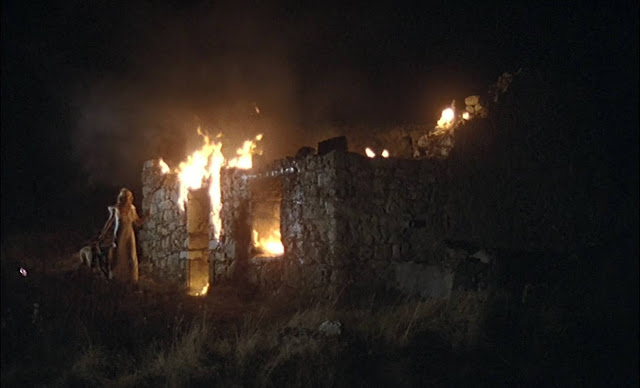 |
| Brigitte Lahaie |
An important part of the movie is the picturesque mountainous rural setting: sleeping leafless vineyards, rocky cliffs, and villages with old stone houses.
For those who already know and love this film, I made this print T-shirt design. Download it for free (as well as my 50 other b-movie shirt prints) and order a shirt from any print-on-demand service you like.
Zombie Lake (1981)
Plot Summary
In a French village, people are murdered by mysterious killers. The murderers appear to be living dead fascist soldiers slayed by the French Resistance fighters during World War 2. The nazi soldiers’ bodies were thrown into the nearby lake. And now they are back to life seeking revenge.
About the Film
This is probably the lowest quality film Jean Rollin has made (not counting
his X-rated works that he, regretfully, also had to shoot just for money).
Jean Rollin hated Zombie Lake himself and renounced it for years.
However, I like it because of how ridiculous it is. If you are looking for a
movie that looks hilarious because of how primitive and badly-made it is, this
is what you need.
 |
| Pierre-Marie Escourrou as the main zombie character |
Interestingly, even in the film of such a primitive subgenre catering to viewers who just want to look at rotting zombies ravaging the world (and boobs of their victims), there is an important sentimental storyline involving a cute relationship between one of the living dead soldiers and a little girl. I’m not sure if this was in the original script (written by Julián Esteban and Jess Franco), but this looks pretty much in Jean Rollin’s style.
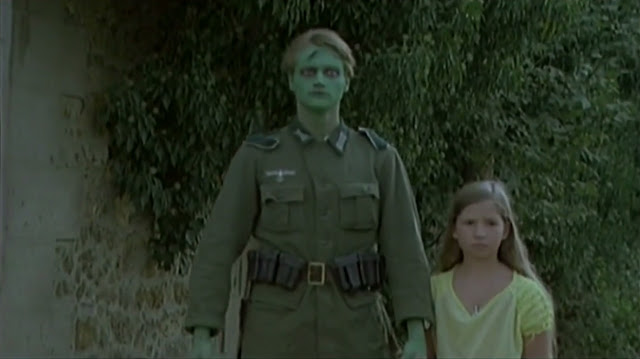 |
| Pierre-Marie Escourrou and Marcia Sharif (supposedly) |
It’s also interesting to see Howard Vernon (a frequent actor in Jess Franco’s films) playing in Jean Rollin’s movie. Originally Jess Franco was supposed to be the director, but he had to cancel, and Jean Rollin replaced him. Also, Jean Rollin himself plays one of the main roles.
For those who already know and love this film, I made this print T-shirt design. Download it for free (as well as my 50 other b-movie shirt prints) and order a shirt from any print-on-demand service you like.
The Escapees (1981)
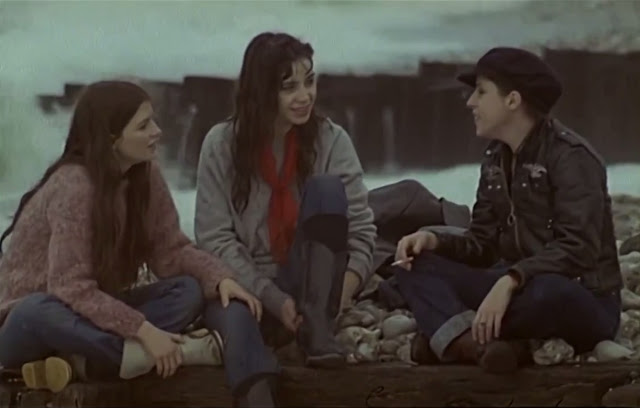 |
| Left to right: Christiane Coppé, Laurence Dubas, and Marianne Valiot |
Plot Summary
Two young girls escape from a psychiatric clinic. They have no idea of where to go and what to do. Guided solely by luck, they meet various odd characters and get into multiple adventures and troubles.
 |
| Christiane Coppé (left) and Laurence Dubas (right) |
About the Film
The Escapees is a cute and tragic adventure story about two companions
in misfortune. It focuses on the touching friendship between the young girls
with very different characters — one is a brave leader, and another one is a
timid follower. Both of them, however, have tender and sensitive souls.
 |
| Laurence Dubas (left) and Christiane Coppé (right) |
The film has a rather melancholic and pessimistic vibe, similarly to The Night of the Hunted. This story is also a good reminder of what can happen to you if you don’t listen to your mom who says you should be cautious about whom you make friends with.
The setting is semi-rural and provincial. The events take place in and around
a seaside town. Many scenes involve a harbour.
The Living Dead Girl (1982)
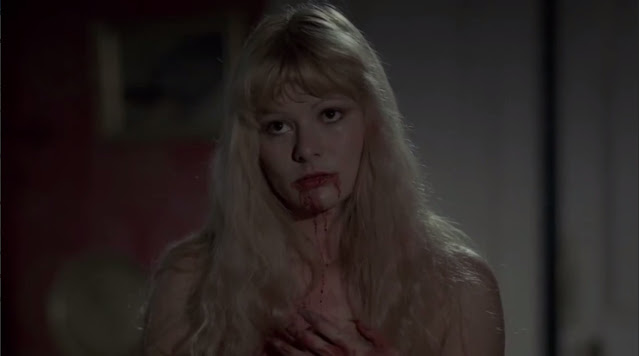 |
| Françoise Blanchard as the living dead girl |
Plot Summary
Catherine (Françoise Blanchard), a dead young woman, is accidentally awakened
from her sleep, which was supposed to be eternal. The girl’s brain is damaged.
She doesn’t behave like a normal person. Hunger makes her kill and eat people
she meets.
A close friend from Catherine’s childhood, Hélène
(Marina Pierro), finds her. She takes care of the dead girl and tries to
restore her memory and sanity, which is a dangerous and difficult endeavour.
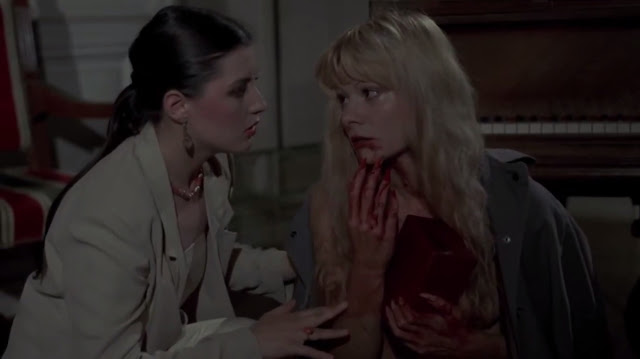 |
| Marina Pierro and Françoise Blanchard |
About the Film
In Jean Rollin’s third attempt to make a film about the living dead, he steps
away from the zombie apocalypse topic. Instead, the story concentrates on the
situation of one particular person — the living dead girl.
Throughout
the film, we empathize with her and Marina Pierro’s character who has to go
through a nightmare to help her friend whatever it may take. This is one of
the traditional Jean Rollin’s bases for a movie plot — a relationship between
two female soulmates.
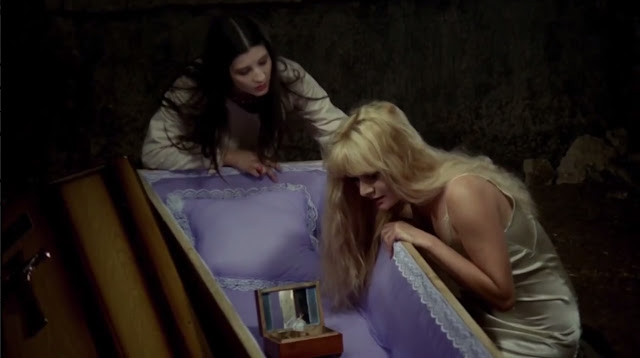 |
| Marina Pierro and Françoise Blanchard |
Apart from this sentimental constituent, the movie features multiple scenes of
bloody violence. In one of them, as the dead girl’s victim, we see Fanny
Magier whom we already remember for her role in Fascination (Hélène,
the chief of the perverse ladies’ society). Ironically, in reality Françoise
Blanchard was one of Fanny’s best friends, which I learned from
Fanny Magier during our interview.

|
|
Françoise Blanchard and Fanny Magier |
The culmination combines the two aforementioned components — the sentimental and the horror one — to give the viewer a terrifying and heartbreaking experience. It does look scary and feel enormously tragic (even despite Jean Rollin’s ‘trademark’ filming flaw — lighting a night scene in a way that it’s obvious it’s lit by a powerful searchlight). Such an emotionally dark and devastating ending contrasts with the rest of the film which is, as usual for Jean Rollin’s works, full of cute imperfections and naivety.
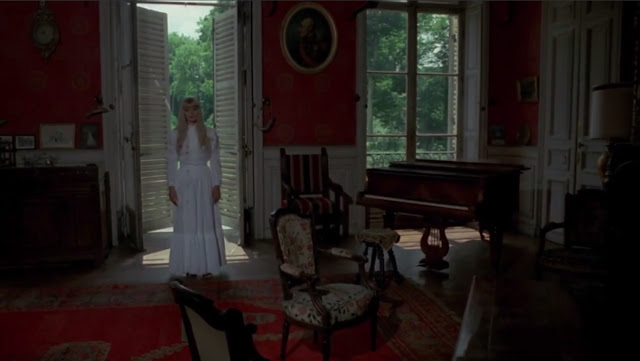 |
| Françoise Blanchard as the living dead girl |
The setting is rural. Our characters reside in a nice luxury mansion. And there is a cute scene of a local festival where a village music band plays accordion-led rock and roll, blues, and French folk tunes.
For those who already know and love this film, I made this print T-shirt design. Download it for free (as well as my 50 other b-movie shirt prints) and order a shirt from any print-on-demand service you like.
The Sidewalks of Bangkok (1984)
Plot Summary
French Intelligence (something like French FBI) agents are competing with a criminal gang to obtain a tube containing a biological weapon first.
A French Intelligence agent, killed by gangsters, supposedly gave this tube to his girlfriend — Eva, a young girl working in a Bangkok brothel. Eva, who doesn’t know about her lover’s death, is transported from Bangkok to France where, as she is told by the gangsters, she should meet her boyfriend and return the tube to him.
To see her beloved again, Eva has to go through a number of cruel adventures and intrigues.
About the Film
This is one of the least popular Jean Rollin films that can be compared to Killing Car in terms of the genre and overall feel.
The movie is shot in the style of the 70’s-80’s action films, with a cool funky soundtrack by George Lartugeau. The events take place in France (most of the film) and in Japan, which is supposed to look like Bangkok (about 1/3 of the film, at the beginning).
Many details of the plot are illogical, which is usual for Jean Rollin’s films. There are a lot of scenes with senseless shooting. The part showing the Bangkok brothel is saturated with nudity. The signs of local shops and other businesses in the streets are in Japanese and English, and not in Thai, which makes it obvious for those who know one of these languages that it’s not Bangkok but Japan. In short, it’s a shoddily-made exploitation film comparable to Zombie Lake and Killing Car.
Overall, I liked the movie — it was fun to watch. Despite the lack of logic (which is not a disadvantage, as silliness makes the film funnier), the intrigue is preserved. I was wondering what the story would end with and didn’t feel bored.
In the movie, we meet actors whom we know by Jean Rollin’s previous films:
- Françoise Blanchard who plays the main role in The Living Dead Girl.
- Jean-Pierre Bouyxou — Jean Rollin’s assistant in some of his films (including X films) whom we also see as an extra in The Demoniacs kissing Monica Swinn among the tavern visitors. In The Sidewalks of Bangkok, he plays the captain Bouyxou. Additionally, he played small roles in Jess Franco’s films and other B-movies.
- Brigitte Borghese who holds an analogical role to her previous one — the rich and perverse chief of the gang in Fly Me the French Way.
- Olivier Rollin, the brother of Jean Rollin who also plays one of the living dead in The Grapes of Death.
 |
| The film opens with a cool shot of badass Jean Rollin shooting from a revolver. Unfortunately, this short scene is the only scene with him in the movie. |
In Jean-Pierre Bouyxou’s video interview (in French) by Bis Not Dead, Jean-Pierre says that the film was shot for Jean-Claude Benhamou who financed the project and whose goal was to show his trained German shepherd dog Rudy.
Jean-Pierre Bouyxou also tells a small anecdote: there is a scene where characters were attached to the railway to have a wagon go over them. The rails were obviously abandoned. While filming, Jean-Pierre Bouyxou told Jean Rollin that it would be obvious and look ridiculous to the viewers. Jean Rollin said “I don’t give a damn”.
Looks like, as this wasn’t a fantasy film (which was his preferred genre), Jean Rollin didn’t try his best to do it well. I guess he made it just for the money. Fortunately, and as usual, it only made the film funnier rather than boring.
Lost in New York (1989)
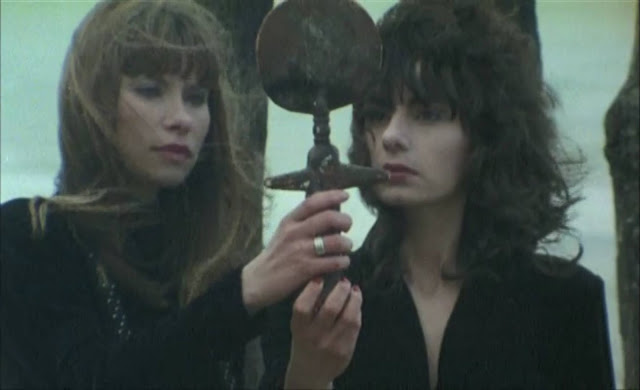 |
| Catherine Lesret (left) and Catherine Herengt (right) |
Plot Summary
Two best friends, little girls, read an old magazine about fantastic
adventures in distant countries and dream of being the characters of these
stories. They find a magic amulet allowing them to travel through time and
space. The mystical object transfers the girls to New York where they, now
being young twenty-three years old ladies, lose each other. In the unfamiliar
and fascinating labyrinth of the megapolis, the friends have to go through
multiple obstacles to reunite.
About the Film
Lost in New York is very different from Jean Rollin’s exploitation
films. It’s already one of his later works where, unlike in the 70’s, he
wasn’t restrained by commercial rules demanding gratuitous eroticism to assure
success among the cinema audience.
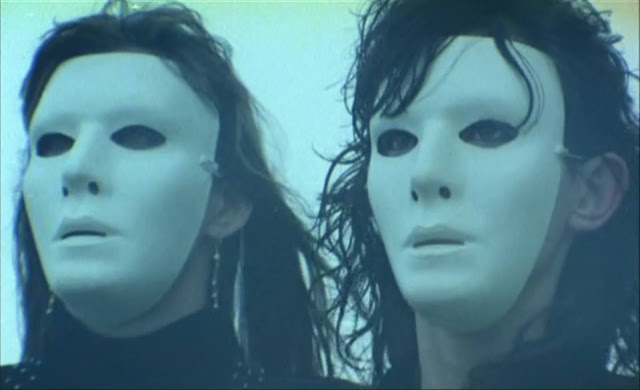 |
| Catherine Lesret (left) and Catherine Herengt (right) |
Lost in New York is a fantasy film built around Jean Rollin’s favorite topic — a spiritual relationship between two women. It lacks the traditional structure — a problem introduced at the beginning that is supposed to be resolved at the end. This work is rather an experimental art film. Those for whom a clear storyline is more important than the ambiance will only see two girls walking around in New York during almost the whole film, and will probably get bored.
 |
| Catherine Herengt |
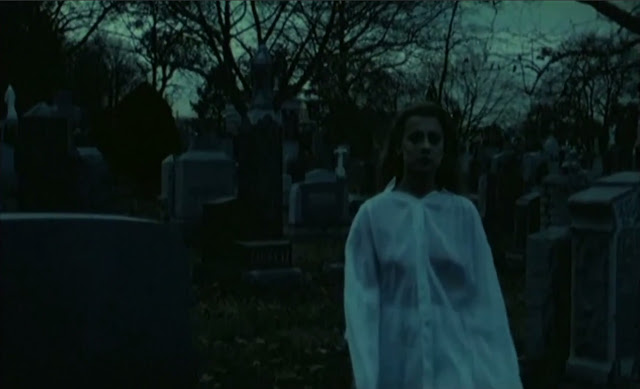 |
| Catherine Rival (supposedly) |
The movie was shot almost unplanned, when Jean Rollin had to go on a trip to New York for business and decided to use this opportunity to also make a film. Then, he filmed additional scenes in France. Yet, this is one of the director’s most personal works, and I think it’s cute.
 |
| Catherine Lesret (left) and Catherine Herengt (right) |
Apart from the urban, New York, ambiance, there are multiple beautiful scenes shot at Jean Rollin’s favorite pebble beach in Pourville Sur Mer, near Dieppe (the one we see in multiple other Jean Rollin’s films).
 |
| Jean Rollin's favourite pebble beach in Pourville sur Mer, near Dieppe |
I would suggest that you watch this movie either if you like experimental art films or if you are already Jean Rollin’s fan who wants to watch it just because it’s your favourite director’s work.
For those who already know and love this film, I made this print T-shirt design. Download it for free (as well as my 50 other b-movie shirt prints) and order a shirt from any print-on-demand service you like.
Killing Car (1993)
 |
| Véronique D. Travers and Frédérique Heymann-Gony versus Tiki Tsang in an intense gun fight scene |
Plot Summary
A young woman travels to different places tracking down various people to kill
them. Her victims don’t recognize her, but she seems to have a serious
sentimental reason for these murders. Each time, after killing her victim, the
woman leaves a small toy car near their body. Police try to resolve this
enigmatic case and capture the mysterious serial killer.
About the Film
This is a detective criminal story ordered by a TV channel. There is nothing
personal in this movie. It will be interesting mostly to those who want to
watch it just because it’s Jean Rollin’s work. And the fans will be rewarded
by a reference to Fascination in one of the scenes.
 |
| Véronique D. Travers |
Another interesting fact is that this is the first film in the making of which Véronique Djaouti-Travers was involved. Véronique is Jean Rollin’s close friend and right-hand person since the early 90’s. Jean Rollin’s fans owe her a lot for her important contribution to making Jean Rollin’s five final films. In Killing Car, we even see Véronique in one of the roles at the beginning of the movie.
The Two Orphan Vampires (1997)
 |
| Véronique D. Travers (Lady of Midnight) scares Alexandra Pic (left) and Isabelle Teboul (right) who play the two orphan vampires |
Plot Summary
Two blind adolescent girls live at an orphanage. Everyone thinks they are nice
and cute children and pities them for their blindness. Nobody knows that in
reality the girls are children of evil — vampires who regain their vision at
night.
One day, the girls are adopted by a kind old man. For many
other orphans, this would mean their most important dream coming true — the
beginning of an idyllic family life. But not for our little demoniacs who are
attracted by their dark nature calling them to take the path of evil.
About the Film
This is Jean Rollin’s another movie about two soulmate girls. It’s similar to The Escapees, but this time it’s about vampires. I also find the storyline similar to Don’t Deliver Us from Evil (1971) by Joël Séria, which is also about two teenage girls who consciously decide to serve the powers of darkness.
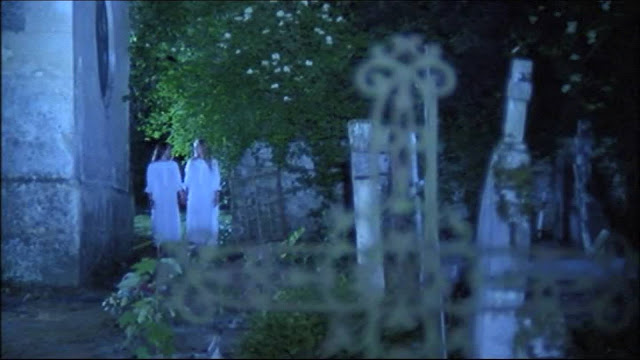 |
| Alexandra Pic (left) and Isabelle Teboul (right) as the two orphan vampires |
The film feels similar to Jean Rollin’s 70’s movies, except for the 90’s
ambiance and lack of eroticism. There is only one shot of the girls being
topless and a scene with Nathalie Karsenty briefly showing her breasts.
The
movie is based on Jean Rollin’s novel with the same title as the film’s —
Les deux orphelines vampires published in 1993. According to an
interview of one of the two actresses (included in a DVD release), the film
appeared to be much less erotic than the book, fortunately for her.
So The Two Orphan Vampires is mostly a sentimental dramatic story. Interestingly, while the viewer is supposed to empathize with the two main characters, they are actually evil. The girls commit crimes not only to satisfy their natural vampyric hunger for blood, but also just for the sake of being bad. At the same time, they have an innocent look and care about each other in difficult and dangerous situations, which is cute. This combination gave me mixed feelings.
The setting is Paris — the streets, a cemetery, a chapel, a train station
(reminiscent of The Iron Rose and The Night of the Hunted), a
chapiteau circus (evoking the chase and gun fight at an empty fair in the
director’s previous film — Killing Car), etc. However, there also is a
scene shot in New York evoking Lost in New York.
 |
| Véronique D. Travers as the Lady of Midnight |
Véronique Djaouti-Travers, mentioned above, also played one of the memorable roles in this film, which was literally a heroic effort for her. The shooting cost her two serious health problems — fractured spine and damaged jaw! Learn more about this from my interview with Véronique D-Travers.
For those who already know and love this film, I made these print T-shirt designs. Download them for free (as well as my 50 other b-movie shirt prints) and order a shirt from any print-on-demand service you like.
Dracula’s Fiancée (2002)
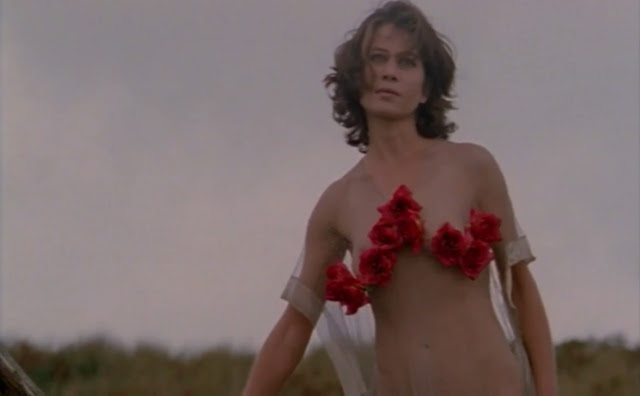 |
| Cyrille Iste (Cyrille Gaudin) as the Dracula's fiancée |
Plot Summary
A professor specializing in the supernatural and his young assistant, Eric,
pursue Dracula’s descendants. They find out that there is a woman kept by an
odd order of extravagant nuns protecting her from Dracula whose wife she is
destined to become, according to a prophecy.
Eric meets the lady
and falls in love with her. In order to save the woman from the predicted
union with Dracula, the boy has to deal with various weird supernatural
characters serving the forces of evil: an ogress, a wolf woman, witches,
vampires, and other creatures from Dracula’s world.
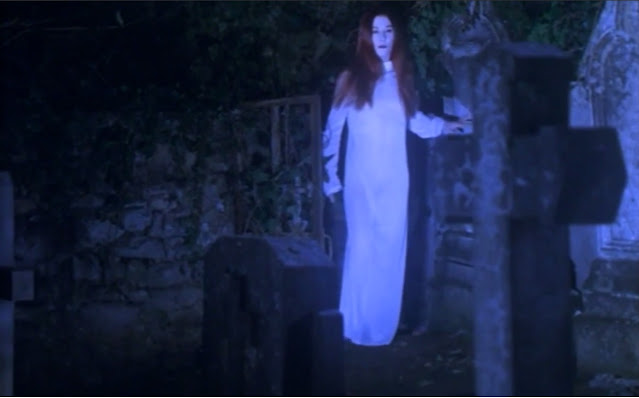 |
| Sandrine Thoquet as the Vampire |
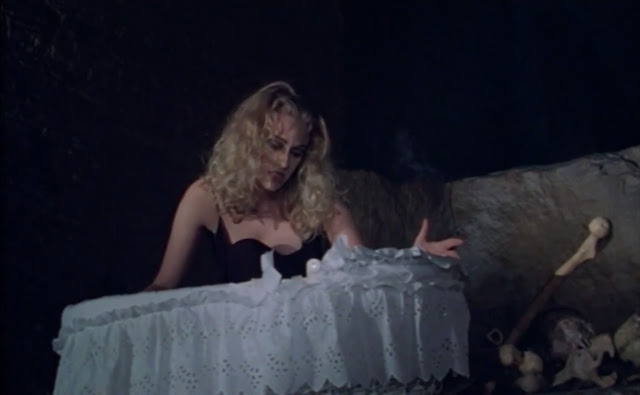 |
| Magalie Madison as the Ogress |
About the Film
Dracula’s Fiancée is saturated with the weird supernatural characters
enumerated above. While it conserves the vibe of a magical fairy tale, it
partially feels like a parody. In fact, almost none of Jean Rollin’s movies
look 100% serious because of the naivety and technical flaws. But in
Dracula’s Fiancée, certain scenes seem to be made ironic on purpose.
The
brightest example is the convent of The Order of the White Virgins — the nuns
whose behaviour is obviously parodic and ridiculous. They act too playfully
for the classic image of a nun and do things deemed sinful by the real world
clergy.
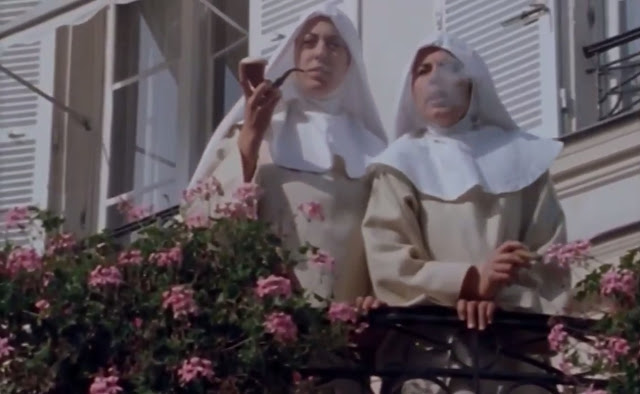 |
| Marianna Palmieri (left) and Mira Petri (right) |
There is still romanticism, fantasy, and tragedy normal for Jean Rollin’s
films. As well as beautiful locations, notably the seashore and castle where
the final events unfold.
I would recommend watching
Dracula’s Fiancée after becoming familiar with Jean Rollin’s 70’s
fantasy films. While this movie does look like a traditional Jean Rollin’s
story, the origins of its style lie in his first works, such as
Lips of Blood, that looked more original and fresh for their time.
 |
| Cyrille Iste (Cyrille Gaudin) in the beautiful yard of the castle |
Additionally, when seeing familiar actors from Jean Rollin’s earlier films
making cameos in Dracula’s Fiancée, you will have a warm feeling of
meeting old friends, which you won’t have if you choose it as your first Jean
Rollin movie.
Pay attention to a very short shot of the nun jumping
over a skipping rope — it’s Catherine Castel, one of the Castel twins. There
are also Brigitte Lahaie, Natalie Perrey, and Véronique Djaouti-Travers as the
violinist.
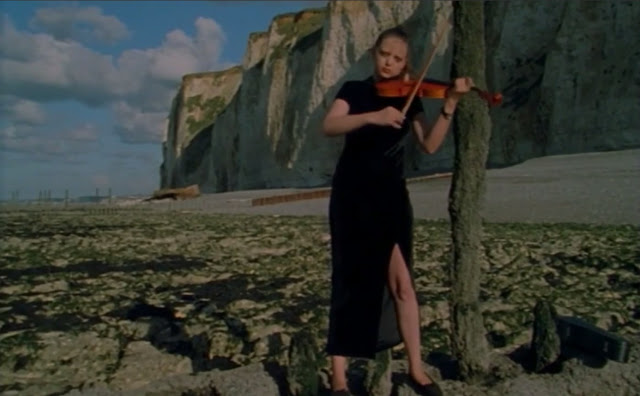 |
| Véronique D. Travers |
As for the others, there is Sabine Lenoël, a highly talented and beautiful
actress. She plays an oriental dancer at the nun’s convent. Later Sabine
played two memorable roles in The Night of the Clocks and
The Mask of Medusa — Jean Rollin’s final films.
Sandre
(Sandrine) Thoquet as a vampire — Jean Rollin’s niece whom we also see in
Two Orphan Vampires and The Night of the Clocks. In my opinion, the
role in Dracula’s Fiancée is her most memorable one.
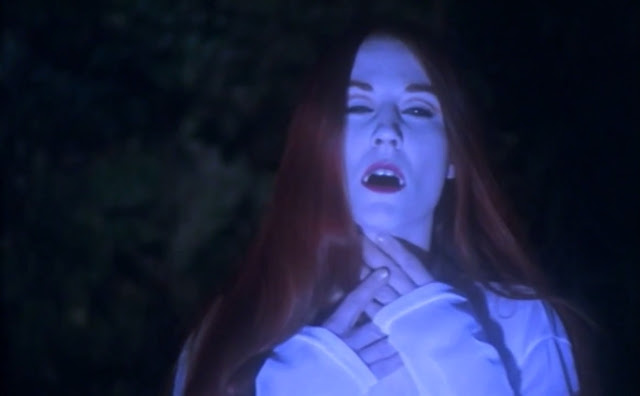 |
| Sandrine Thoquet as the Vampire |
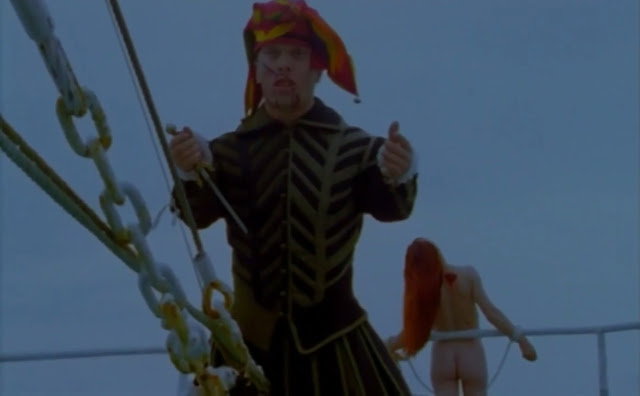 |
| Thomas Smith |
Thomas Smith, the little person whom we also see in
The Mask of Medusa as well as in The Scent of Mathilda, a 1994
pornographic film by Jean Rollin produced by Marc Dorcel.
And
Cyrille Iste (aka Cyrille Gaudin), who plays Dracula’s fiancée, is Natalie
Perrey’s daughter.
The Mask of Medusa (2009)
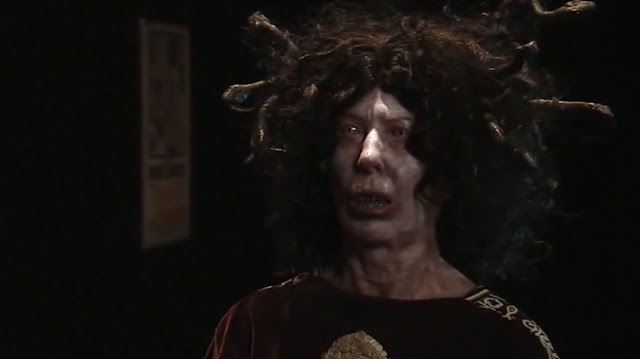 |
| Simone Rollin as Medusa |
Plot Summary
The Mask of Medusa consists of two parts.
In part 1, Medusa
Gorgon (Simone Rollin, Jean Rollin’s wife) has lost almost all her memory.
This is the result of a curse caused by her sister, Euryale (Sabine Lenoël),
as revenge. After many years since their quarrel, Medusa comes to the
abandoned Grand Guignol theater where Euryale and her other sister, Sthéno
(Marlène Delcambre), live to confront her siblings again, attempting to return
her memory.
Part 2 shows us the life of Sthéno in a crypt at the
Père Lachaise cemetery, after the adventures she went through in part 1.
About the Film
Each part of the film has a different mood.
The first episode feels
surreal, macabre, and depressing. Through Medusa, an evil ancient entity with
decaying memory, we see an image of an old person with degrading physical and
mental well-being who is moving to the end of life. And the Collector of
statues (Bernard Charnacé whom we also see in The Two Orphan Vampires)
further immerses us into savoring thoughts about death. Sadly, this coincides
with the fact that Jean Rollin was going through his own final years when
making this movie.
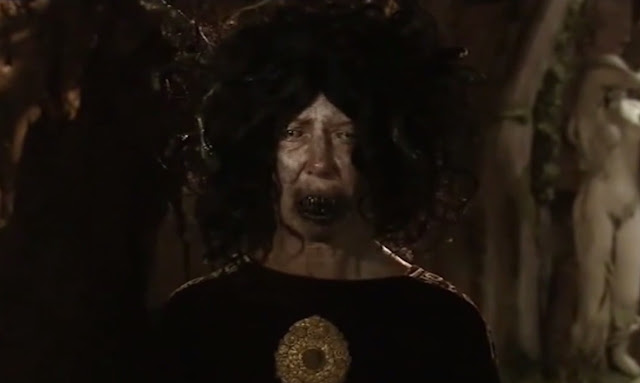 |
| Simone Rollin as Medusa |
The film contains a couple of horror scenes that actually look sinister. In
particular, I loved Medusa’s truly terrifying makeup. Also, Simone Rollin’s
acting is very solid in this role. Her cold, lifeless voice intonation
perfectly depicts an inhuman, merciless demonic being.
The acting
style makes The Mask of Medusa look rather like a theater play.
Especially the pompous speeches of Medusa, the theatre guardian (Jean-Pierre
Bouyxou), the stone statue collector, and Euryale (ravishing Sabine Lenoël) —
the most professional actors in the film. The exaggerated, theatrical manner
in which these characters speak is far from anyone’s intonation in real life.
But it’s beautiful.
 |
| Sabine Lenoël as Euryale |
However, the movie doesn’t lack acting and directing (or probably
screenwriting) flaws either. Notably, too sudden change of Medusa’s sisters’
behaviour — from brave and audacious to scared and piteous — in the scenes of
their confrontation. Actors playing stone statues who are supposed to be
perfectly immobile, but we see them wiggling. And the young girl (Gabrielle
Rollin, Jean Rollin’s granddaughter) at the very beginning who pronounces her
parts in a way that it’s obvious she isn’t a real actress.
The
first part is mostly shot at the Grand Guignol theatre that in the years of
Jean Rollin’s youth specialized in shocking theatrical horror shows. We see
old posters announcing plays at the theatre, conserved from the 50’s-60’s. We
also listen to Jean-Pierre Bouyxeau’s speech about this place’s atmosphere
supported by its history. I remember Jean Rollin mentioning the Grand Guignol
theatre in one of his video interviews as a response to a question about the
origin of his interest towards the horror genre. Apparently, it was an
important location to him.
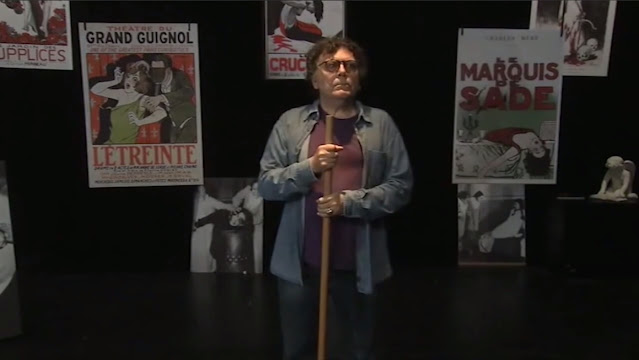 |
| Jean-Pierre Bouyxou |
The second part of The Mask of Medusa feels much lighter than the first
and is cute overall. We witness Sthéno meeting another girl (Delphine
Montoban), showing her the crypt she lives in, and making friends with her.
This even includes a few humorous moments, strongly contrasting with the mood
of the first part.
While there is very little nudity in the movie,
it’s still present. Just like with The Night of the Clocks and his other
more recent films, unlike in the 70’s, Jean Rollin didn’t have to conform to
producers’ requirements of making
movies
erotic enough so that the audience wouldn’t find them boring. Here he had a
chance to use nudity only where it made sense.
 |
| Delphine Bonnaud (left) and Marlène Delcambre (right) |
There are multiple references to Jean Rollin’s earlier films which will feel
dear to his fans. For example, the setting in the second part is the Père
Lachaise cemetery and a beautiful crypt in it. At Père Lachaise, Jean Rollin
filmed scenes for his first feature film — The Rape of the Vampire, and
maybe others. There is also a reference to Fascination and Jean Rollin’s
more recent films.
Unlike the references in
The Night of the Clocks, they are more subtle. So I would advise beginner
rollinists on a mission to watch all of the director’s films to save
The Mask of Medusa for the end rather than start with it.
The Rest of Jean Rollin’s Filmography
Early Short Films
Jean Rollin’s career as a director started in 1958 with his 10-minute experimental film Les amours jaunes (Yellow Love). Since then, and until his first full-length, The Rape of the Vampire (1968), Jean Rollin has filmed a few more short black-and-white movies. Some of them are available on YouTube.
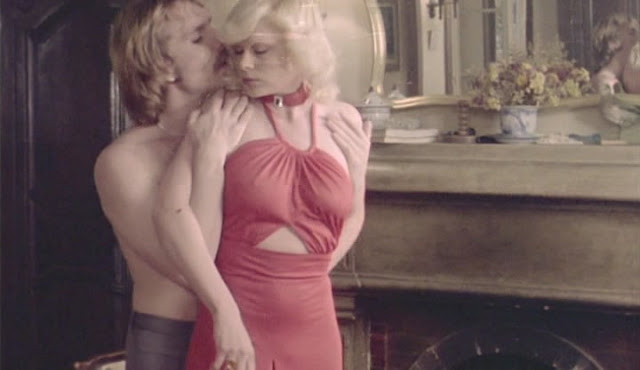 |
| Karine Gambier and Cyril Val (supposedly) in Countess X (La Comtesse Ixe), 1976 |
Another large part of Jean Rollin’s films includes about twenty hardrore porn
movies. He made them under the pseudonyms Michel Gentil and J.A. Laser.
Most
of the films I described above are made by Jean Rollin out of his love for the
cinema. The director loved making meaningful films, especially fantasy
stories. However, it often happened that these works weren’t successful among
the movie audience. This resulted in the financial failure, even though Jean
Rollin followed producers’ requirements to incorporate enough nudity — an
important detail for the commercial success at that time.
The need
to make money to be able to create fantasy films (rather than earning money by
making fantasy films) led Jean Rollin to also making pornographic films, which
he hated. I remember reading some of the crew members’ or actors’ memories
about filming porn with Jean Rollin. Probably because of being embarrassed,
the director was absent during shooting sex scenes!
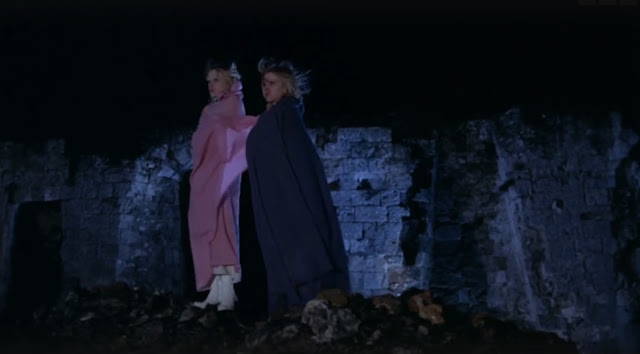 |
| Twin sisters Castel in Lips of Blood (Lèvres de sang), 1975 |
Here is another funny story: there is a hardcore pornographic version of Jean
Rollin’s Lips of Blood titled Suck Me, Vampire (Suce moi, vampire). Jean Rollin had denied the authorship of Suck Me, Vampire for a long time,
until he finally admitted it after many decades.
The film consists
of the original movie’s content plus meaningless hardcore pornographic scenes
inserted throughout its duration and replacing some of the original scenes.
The
origin of this ‘version’ lies in the total commercial failure of
Lips of Blood. To compensate the investors for the money loss, Jean
Rollin took his movie and quickly stuffed it with porn inserts. Even though the
plot was ruined because of this, Suck Me, Vampire became
more commercially successful than the original version!
I didn't watch this version completely and attentively. But Christian Valor (one of the chief editors at the French blog Psychovision), who did, clarifies:
I wouldn't be so categorical concerning "Suck Me Vampire", though. Of course, the hardcore scenes are meaningless and they totally ruin the film but most of the actresses who appear in them are in the original film: Martine Grimaud, Béatrice Harnois, Claudine Beccarie, Sylvia Bourdon and even Anita Berglund and Hélène Maguin.
Moreover, it seems to me most of these scenes were shot at the same locations as Lips of Blood, and probably at the same time: Béatrice Harnois's hardcore scene, for instance, is the "logical" continuation of her scene in Lips of Blood...
This story shows
that a significant part of the B-movie audience would go to theaters just to
see explicit content. Sadly, fantastic, romantic, and supernatural love
stories weren’t what they cared about.
Fortunately, time turned the
tables on this injustice. Now Jean Rollin is mostly known for his fantasy
films, and his pornographic works are much more obscure, even though initially
they used to be more commercially successful.
Contribution to Other Directors’ Films
Jean Rollin filmed an additional scene for
A Virgin Among the Living Dead (1973) by Jess Franco. It’s a surreal nightmarish sequence where the main character meets phantoms
appearing out of the darkness of the night. It wasn’t included in the
director’s original version, however.
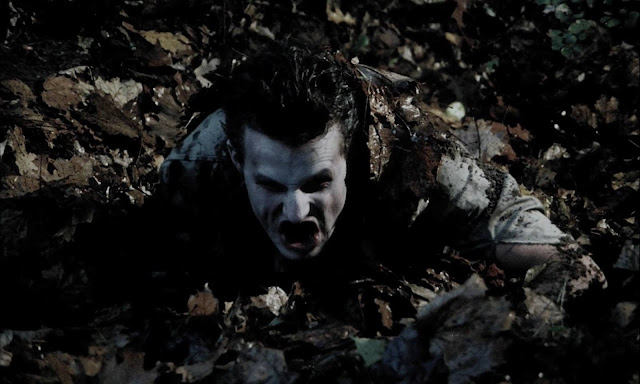 |
| Shots from Jean Rollin's scenes in A Virgin Among the Living Dead (1973) by Jess Franco |
I have a shirt design with this scene as well. Download it for free (as well as my 50 other b-movie shirt prints) and order a shirt from any print-on-demand service you like.
Later, Jean Rollin took part in directing Emmanuelle 6, a 1988 movie
which was mostly directed by Bruno Zincone. Jean Rollin was also a
screenwriter for the film. Emmanuelle 6 exists in a hardcore and
softcore versions.
These are only a few facts that I know of and
deem important. Apart from that, Jean Rollin is also credited as an editor,
director’s assistant, producer, screenwriter, and actor in many other
works.
I created this blog for like-minded people with weird taste for unpopular, obscure, and sleazy films and music. If you feel our tastes are similar, let's be email friends. You can also reach out to me if you need help in finding any rare film or music mentioned in by blog.


%20T-Shirt%20(Myriam%20Watteau).jpg)
%20T-Shirt.jpg)




%20Jean%20Rollin%20Film%201974.jpg)
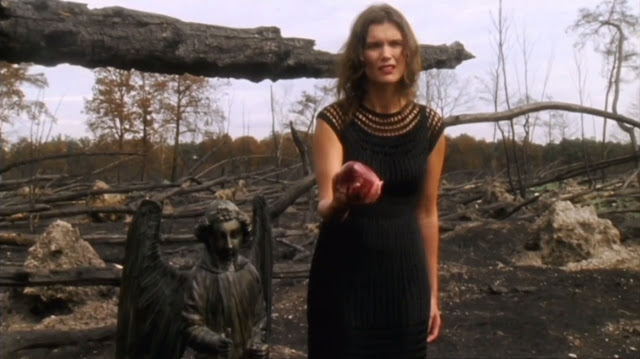



%20T-Shirt.jpg)
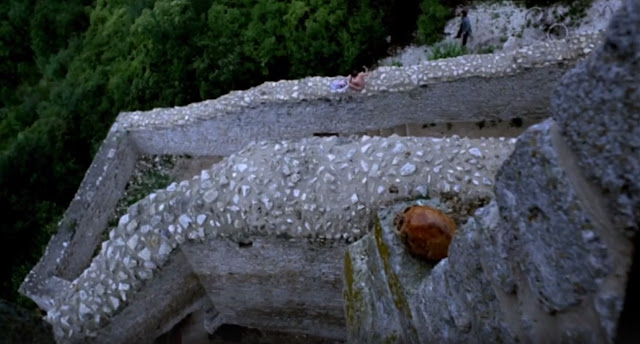
%20T-Shirt.jpg)
%20T-Shirt.jpg)


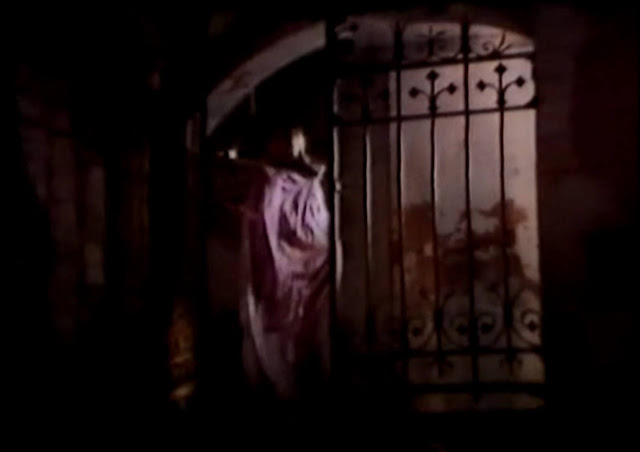
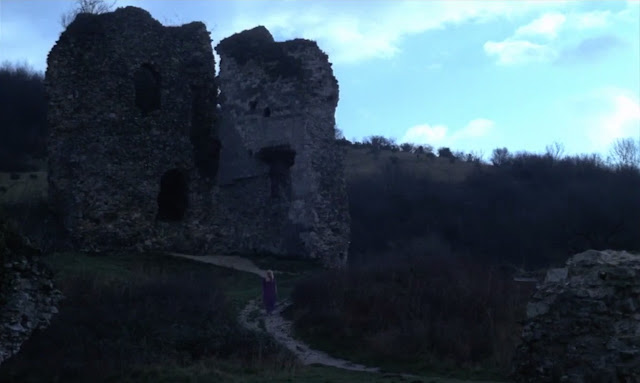
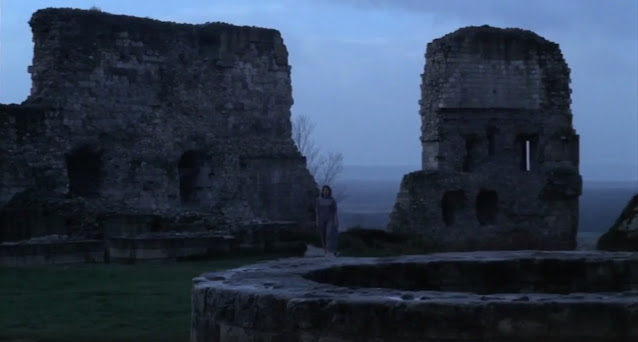
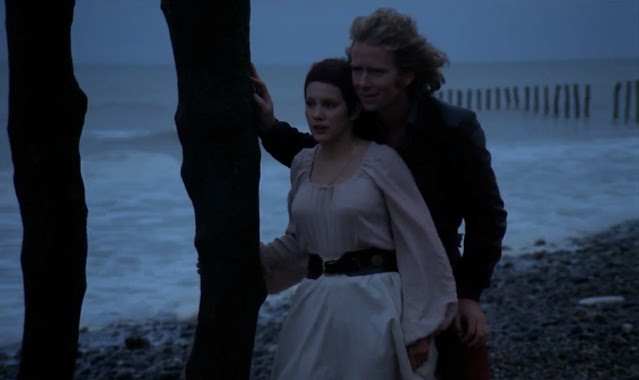
.jpg)
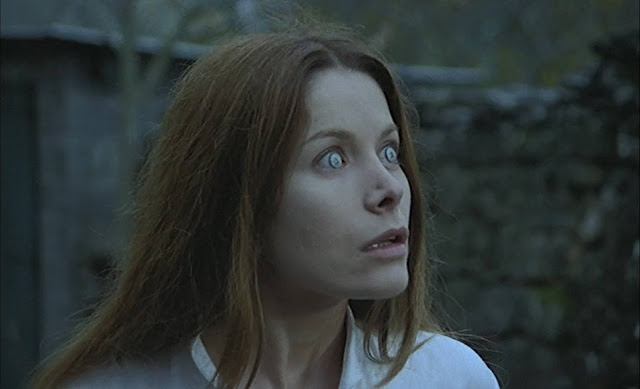

%20T%20Shirt.jpg)


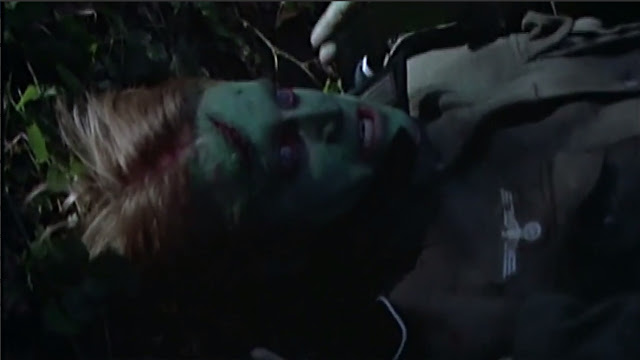
%20T-Shirt.jpg)

%20T-Shirt%20640.jpg)
%201984%20film%20by%20Jean%20Rollin.jpg)

%20T-Shirt.jpg)
%20T%20Shirt%202.jpg)
%20T%20Shirt.jpg)


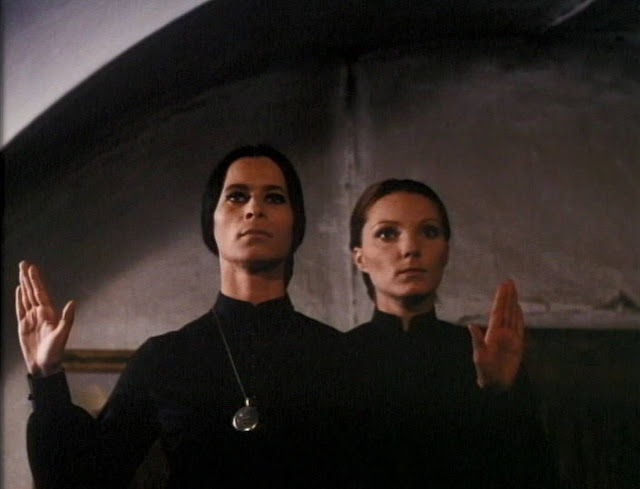

Excellent write-up. You're even kind to 'Zombie Lake', which I am grateful for!
ReplyDeleteThat's the funniest Jean Rollin's film. And laugh is a good emotion! Thanks for the comment, Nigel.
Delete